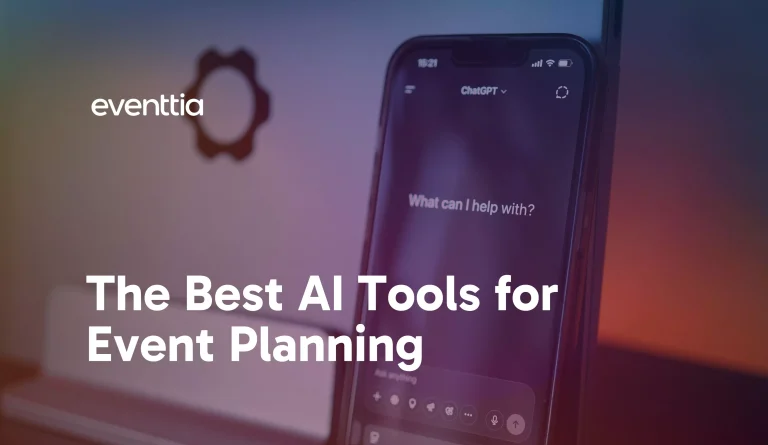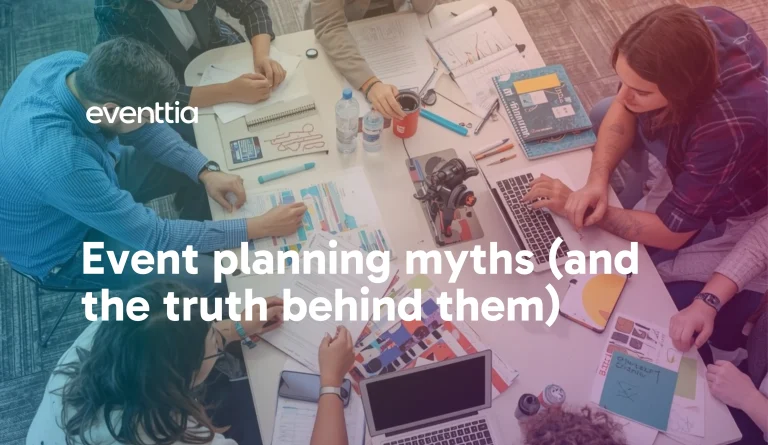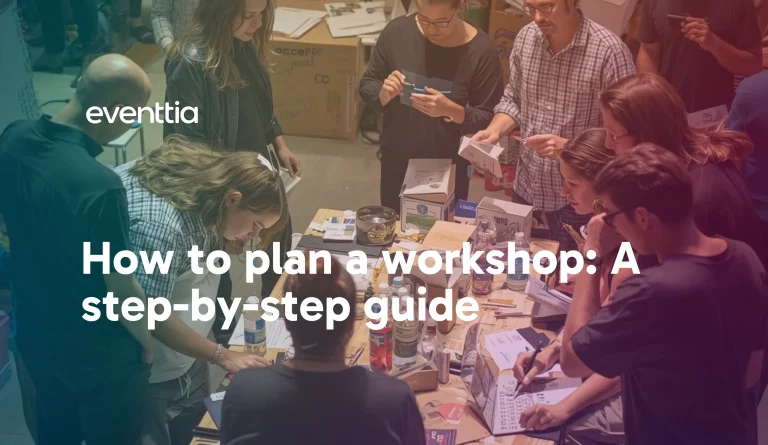Event planning has always been a balancing act, where planners juggle logistics, budgets, vendors, attendees, and countless details that need to align perfectly. Many event planners have already discovered how AI can change the way events are organized, marketed, and experienced, and save significant time with AI-based tools for event planning and execution.
From streamlining communications with chatbots, to predicting attendance with data-driven insights, to automating tedious administrative tasks, AI is helping planners save time, reduce stress, and deliver unforgettable experiences. Let’s take a look at some of the best AI tools for event planning and how they can help level-up managing your next events.
Using AI for Events: Where it Helps
AI helps organizers save time, reduce costs, and deliver a more engaging experience. Here’s a closer look at where AI can make the biggest difference in event planning.
Event Registration
AI tools like ChatGPT are fantastic tools to brainstorm on your registration plan, making sure it’s comprehensive and robust. You can even use Eventtia’s event registration canvas to format it in an easy to read and easy to share file.
Once your registration configuration is set up in your event software, you can easily personalize registration messages to your different types of attendees and customize badge design with the help of AI.
Event Marketing
Writing personalized content in any language, and creating beautiful visual assets has never been so easy. This means you can spend less time brainstorming copy and more time refining your event’s message and reach.
One of the most time-consuming aspects of planning is getting the word out. AI-powered tools can create social media posts tailored to your audience, generate email campaigns with compelling subject lines, and even suggest multi-channel event marketing strategies to maximize engagement.
Customer Support
Keeping attendees informed is essential, but answering repetitive questions like “Where do I park?” or “What time does the keynote start?” can quickly overwhelm your team. AI chatbots solve this problem by providing instant answers to common queries, available 24/7.
They can also be programmed to guide attendees through the registration process or provide updates if schedules change. After the event, chatbots can be used to collect attendee feedback in real time, offering a more seamless and interactive way to capture important insights.
Analytics
Events generate massive amounts of data, but without AI, much of it can go unused. AI-powered analytics tools can process attendee behavior, session attendance, and engagement levels to reveal what worked and what didn’t.
For example, you can see which sessions had the highest participation, which marketing channels drove the most registrations, or which event features attendees engaged with the most. Afterward, AI can also sift through open-ended survey responses to uncover trends and sentiment, giving you actionable insights to improve future events.
The Best AI Tools for Event Planning
Whether you’re streamlining operations, marketing your event, creating content, or analyzing attendee data, there’s a growing ecosystem of AI-powered solutions to help you do more with less. Below, we explore some of the best AI tools for event planning, what they do, who they’re for, and how to use them.
Tool | Key Features | Primary Use | Pricing | Best For |
Notion AI | AI-assisted notes, summaries, idea generation, integrated with Notion workspace | Organizing/planning content and tasks | Included in Notion Plus/Business (~$8–$15/user/mo) | Teams managing complex event projects |
Canva | AI design tools, Magic Resize, content generation, templates | Creating visuals for events and marketing | Free plan; Pro from $15/mo | Event marketers without design background |
ChatGPT | Conversational AI for content creation, brainstorming, automation, data analysis, image creation | Generating text content and ideas | Free; Plus $20/mo; Pro $25/mo | Planners needing fast content creation |
Gemini | AI-generated images, content creation | Content creation and automation | Free; Pro $20/mo; Ultra $249/mo | Teams needing advanced AI across text, image, and research |
Lovable | AI-generated event pages and event apps | Building event pages and apps quickly | Free; Pro from $25/mo; Business/Enterprise plans available | Event teams wanting custom apps without developers |
Synthesia | AI-generated videos with virtual presenters, customizable scripts | Creating event videos at scale | Starter $30/mo; Corporate plans available | Event teams producing training/welcome videos |
Amper | AI music composition, customizable mood/style/tempo | Producing custom music for events | Custom pricing depending on usage | Organizers needing unique event soundtracks |
Influencity | Influencer discovery, analytics, campaign management | Managing influencer campaigns | From ~$318/mo | Events leveraging influencer marketing |
Gumloop | Workflow automation, integrates data across platforms | Automating repetitive workflows | Free tier; Paid plans start at $37/mo | Planners handling multiple software platforms |
Albert.AI | AI-driven marketing automation and optimization across channels | Automating and optimizing digital ads | Enterprise-level, custom pricing | Large-scale events with digital ad spend |
Chatfuel | AI chatbots for Messenger, WhatsApp, websites | Automating attendee queries and support | Free trial; Pro from $23.99/mo | Events needing 24/7 attendee support |
Grammarly | Grammar, spelling, tone, and clarity checking | Polishing written communications | Free; Premium $12/mo; Business $15/mo | Event comms, sponsorship docs, websites |
Fullstory | Session replay, user behavior analysis, website optimization | Improving digital attendee experience | Pricing on request, scales with usage | Improving registration flow, digital apps |
Predis.ai | AI-generated social posts, captions, visuals | Streamlining event social media marketing | Free tier; Paid plans from $29/mo | Small teams managing event social media |
Brand24 | Social listening, sentiment analysis, real-time monitoring | Monitoring event reputation online | From $149/mo | Tracking event buzz and attendee feedback |
Originality AI | Plagiarism and AI-content detection | Ensuring originality of event content | Pay-per-scan, ~$0.01 per 100 words | Academic/professional event content integrity |
Notion AI
What it does: Notion AI takes the already versatile productivity app Notion and supercharges it with artificial intelligence. Event planners can use it to quickly generate project timelines, brainstorm event themes, or summarize meeting notes. The tool integrates directly into Notion’s workspace, meaning you don’t need to switch platforms to draft content or generate ideas.
How to use it: An event manager organizing a conference could use Notion AI to draft speaker bios, create session descriptions, or even generate FAQs for attendees. It’s particularly useful for teams working collaboratively, since content can be generated, reviewed, and stored in one place. For planners juggling multiple events at once, Notion AI helps keep everything organized and streamlined.
Canva
What it does: Canva has long been a go-to design tool for non-designers, and its AI-powered features make it even more powerful for event professionals. With tools like Magic Resize and AI-assisted design suggestions, Canva allows users to create high-quality graphics for event invitations, social media posts, signage, and presentations.
How to use it: An event marketer could upload an event logo and quickly generate a consistent set of branded materials across Instagram, LinkedIn, and email headers. Canva’s AI also helps with layout suggestions and even copywriting, making it an all-in-one design assistant. It’s perfect for planners who want professional visuals without hiring a full-time graphic designer.
ChatGPT
What it does: ChatGPT is one of the most versatile AI tools available. It can assist with everything from writing email campaigns and creating event taglines to drafting contracts or proposals. Event professionals can use it to brainstorm ideas, generate blog posts for event promotion, or even simulate Q&A sessions to prepare keynote speakers.
How to use it: For example, if you’re launching a new tech conference, ChatGPT can help create a cohesive theme, develop content outlines, and even generate sample social media posts tailored to different platforms. It’s particularly helpful for small teams or solo planners who need to handle marketing, communication, and logistics all at once.
Gemini
What it does: Gemini is Google’s multimodal AI platform capable of generating text, images, code, and analyzing data. For event planners, it can be used to create promotional content, design visuals, summarize documents, or even provide translation support. Since it integrates closely with Google Workspace, it fits naturally into workflows already built on Gmail, Docs, or Slides.
How to use it: An event planner could use Gemini to draft session abstracts, instantly generate banner images, or analyze survey results after an event. For international events, Gemini’s translation and summarization capabilities can help quickly localize content or condense lengthy reports into actionable insights.
Lovable
What it does: Lovable is an AI-powered no-code platform that creates event pages and apps from natural language prompts. Instead of hiring developers, planners can instantly generate RSVP systems, agendas, or interactive event portals. It supports live editing, integrates with APIs, and allows teams to launch custom-branded tools quickly.
How to use it: An event team could type “Create a registration page with speaker bios and a live schedule” and Lovable would generate a functioning web app in minutes. Organizers can then customize design, add integrations like payment or CRM, and deploy without writing a single line of code.
Synthesia
What it does: Synthesia is an AI video generation platform that allows you to create professional-looking videos using virtual presenters. For event planners, this can save enormous amounts of time and budget usually spent on filming. You can create welcome videos, speaker introductions, or even training content for staff and volunteers.
How to use it: Imagine sending attendees a personalized video briefing with key event details or recording last-minute schedule updates without needing cameras, studios, or presenters. Synthesia makes video production accessible to any event team, regardless of technical expertise, while keeping the quality high.
Amper
What it does: Amper is an AI-powered music creation tool. Instead of licensing costly music tracks or hiring composers, you can generate original background music tailored to your event’s mood and audience. You simply choose the style, tempo, and mood, and Amper produces a unique track in minutes.
How to use it: A corporate gala could use Amper to create elegant background music during dinner, while a fitness event could generate high-energy tracks for workout sessions. It’s a cost-effective solution for events that want custom soundtracks but don’t have access to music professionals.
Influencity
What it does: Influencity is an AI platform that helps event planners identify and manage influencer marketing campaigns. With it, you can analyze influencer performance, audience demographics, and engagement rates to find the right partners for your event promotion.
How to use it: If you’re organizing a fashion event, Influencity can pinpoint micro-influencers in your niche who are likely to resonate with your target audience. This takes the guesswork out of influencer partnerships and ensures you’re investing in the voices that will deliver real impact.
Gumloop
What it does: Gumloop focuses on workflow automation, helping teams connect tools and automate repetitive tasks without needing advanced technical skills. For event planning, this means setting up automations that move data between platforms, like sending attendee registration info from your ticketing platform to your CRM automatically.
How to use it: An event team could use Gumloop to automate the creation of personalized thank-you emails after sessions or to push post-event survey responses into an analytics dashboard in real time. By eliminating manual data entry, planners can focus more on strategy and attendee experience.
Albert.AI
What it does: Albert.AI is an AI-driven digital marketing platform that automates and optimizes campaigns across channels like Google, Facebook, and Instagram. It continuously analyzes data to adjust campaigns in real time for maximum ROI.
How to use it: For an event organizer, this means your digital ad budget is always being used efficiently. For example, if one ad creative resonates more with your audience, Albert will automatically increase its distribution while reducing spend on less effective ads. It’s particularly useful for large-scale events with significant marketing budgets.
Chatfuel
What it does: Chatfuel is a platform for creating AI-powered chatbots, especially for Facebook Messenger, WhatsApp, and event websites. It’s ideal for handling attendee inquiries before and during events, automating FAQs, and even supporting ticket sales.
How to use it: A chatbot could answer common questions like “What’s the dress code?” or “Where is the venue located?” instantly. During the event, Chatfuel could guide attendees to the correct breakout session or provide real-time schedule updates, significantly reducing the workload for staff.
Grammarly
What it does: Grammarly is a writing assistant powered by AI that checks grammar, spelling, tone, and clarity. Event planners can use it to polish everything from promotional emails to event programs, ensuring communications are professional and error-free.
How to use it: If you’re drafting a sponsorship proposal, Grammarly can help you strike the right tone. For international events, Grammarly’s tone and clarity suggestions can make communications more accessible to non-native English speakers.
Fullstory
What it does: Fullstory is an analytics and user experience tool that uses AI to track how people interact with your website or event app. It records user sessions so you can see exactly where attendees struggle or drop off during registration.
How to use it: If a significant number of users abandon the checkout process when buying tickets, Fullstory can reveal whether confusing navigation or slow page load times are to blame. These insights allow planners to optimize digital experiences, leading to higher registrations and better attendee satisfaction.
Predis.ai
What it does: Predis.ai is an AI-powered social media tool that helps you generate post ideas, write captions, and even design visuals. For event professionals, it’s particularly useful in creating a steady stream of content leading up to an event without relying heavily on a full-time social media manager.
How to use it: You could input “tech conference keynote” and Predis.ai would generate engaging LinkedIn post ideas, complete with graphics and hashtags. This helps keep your social media presence active and consistent, even with limited time or resources.
Brand24
What it does: Brand24 is a social listening tool that uses AI to track mentions of your event, brand, or speakers across social media and the web. It provides insights into audience sentiment and helps you engage with conversations in real time.
How to use it: If attendees are tweeting about long lines at event check-in, you’ll know instantly and can respond quickly. Similarly, you can monitor buzz around your event hashtag and highlight positive mentions in your post-event reports. This makes it an invaluable tool for reputation management and attendee engagement.
Originality AI
What it does: Originality AI is a plagiarism detection and AI-content checker tool. Event professionals can use it to ensure that content such as blog posts, promotional materials, or even speaker presentations is original and not AI-generated without disclosure.
How to use it: If you’re publishing guest articles on your event website, Originality AI ensures authenticity and credibility. It’s especially useful for academic or thought-leadership events where originality and accuracy are critical.
Why Event Planners Should Still Approach AI With Caution
While AI offers incredible opportunities for event planners, it’s important not to adopt these tools blindly. The technology is still evolving, and there are murky areas when it comes to governance, ethics, and compliance.
One of the most pressing concerns is transparency. The AI Disclosure Act of 2023 was introduced in the U.S. to require companies to clearly label content that has been generated by AI. If you’re creating promotional videos, articles, or even chatbots with AI, you may need to disclose that fact. Attendees want authenticity, and undisclosed AI usage could risk damaging your brand’s credibility if discovered later.
There are also ethical considerations around data privacy. Many AI tools rely on large volumes of personal or behavioral data to function effectively. When you use AI to analyze attendee demographics, personalize agendas, or track online behavior, you need to ensure that data is collected and processed in compliance with privacy laws such as GDPR in Europe or CCPA in California.
Source:
Overall:
"Eventtia is a powerful platform that has continuously evolved over the years. Its design and reliability give me complete confidence in managing my events seamlessly and efficiently."
Wilmark J. Castaño
E-VENTS SAS
Key Takeaways: Harnessing AI With the Right Event Platform
AI has quickly become one of the most valuable assets for event planners, transforming everything from marketing and customer support to personalization and analytics. Tools like ChatGPT, Canva, and Synthesia can supercharge creativity, while platforms such as Influencity, Brand24, and Fullstory help planners make smarter, data-driven decisions.
But as powerful as these technologies are, they still don’t give you the infrastructure to plan, run, and analyze your events. That’s where Eventtia comes in. From smart automation for registration and check-in to tools that help you personalize attendee experiences and track performance in real time, Eventtia gives you the power of cutting-edge technology without the complexity.
Instead of piecing together a dozen different tools, you can manage your entire event lifecycle in one place, saving time and reducing costs. Schedule a demo today to see how Eventtia can help you and your team plan, manage, and execute your events more efficiently.
Discover how Eventtia helps world-leading brands digitize and scale their events
Learn moreShare




